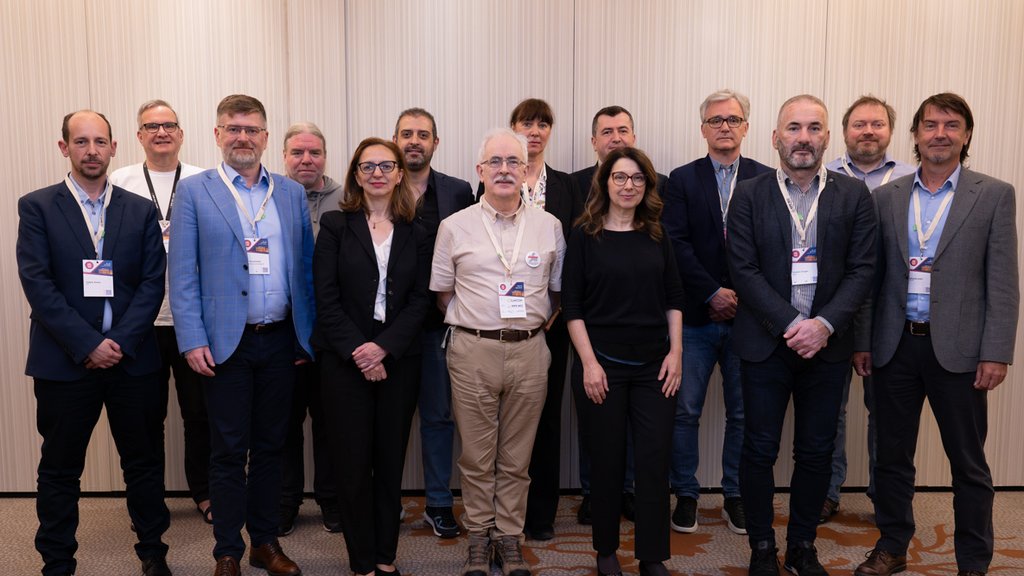You're viewing an archived page. It is no longer being updated.
Meeting Report

On Monday, 22 April 2024, the RIPE NCC held the third Roundtable Meeting for Governments and Regulators from the South East European region. The hybrid event took place onsite in Athens, Greece and online. It was organised alongside the South East Europe Regional Meeting (SEE 12). The meeting was attended by 22 representatives from the SEE Governments and Regulatory agencies as well as the RIPE NCC staff, invited speakers, and community members. Out of those, seven participants joined the meeting online.
The meeting began with Hisham Ibrahim, Chief Community Officer, RIPE NCC, welcoming the participants and outlining the important role these roundtable meetings play to discuss matters of mutual interest for both governments and the Internet technical community, and share knowledge and expertise on developments relevant to the future of the Internet.
During the first session of the event, Desiree Miloshevic, RIPE Cooperation Working Group Co-Chair, presented on current Internet governance timeline, process and challenges. She explained that upcoming discussions and negotiations have the potential to redefine the landscape for Internet governance and cooperation, especially in light of the ongoing negotiations on the Global Digital Compact (GDC) and the 20-year review process of the World Summit on the Information Society (WSIS). One important development lately was the publication of the GDC Zero Draft, which the RIPE NCC welcomed and was able to comment on in an informal consultation organised by the European Union. The RIPE NCC welcomed the principles and objectives put forward in the draft and highlighted its unwavering commitment to promoting open standards, transparent policy development, and community engagement in the context of the GDC.
The following session deep-dived into the topic of network resilience and cyber security policy developments across the EU and the SEE region. Konstantinos Masselos, President of the Hellenic Telecommunications & Post Commission (EETT), underlined the importance of three main elements in the European approach to cyber security and network resilience: information sharing and confidence-building, continuous capacity-building efforts including between public and private sectors, and the strong emphasis on supply chain resilience. Masselos also singled out the need to consider future networks more from the perspective of usage and the services they enable, while making sure these remain compatible with the EU’s Open Internet regulation.
This was followed by a set of presentations by the representatives of the European Commission, the European Cybersecurity Agency (ENISA) and the Co-Chair of BEREC’s Cybersecurity Working Group and Executive Deputy Director of the Croatian Regulatory Authority for Network Industries (HAKOM). They presented on recent developments in the European cybersecurity policy agenda, including the Cyber Resilience Act (CRA), the NIS2 Directive, the implementation of the 5G toolbox of risk mitigating measures, and some major developments on the operational side of cyber security. An important element discussed within the CRA was the current work involving the European Commission and European Standardisation Organisations (ESOs) such as CEN-CENELEC and ETSI on standardisation. New standards will allow for the smooth implementation and will ease compliance for organisations. Participants then emphasised the need to ensure collaboration between ESOs and the Internet community and standards organisations such as IETF in making sure European standards are fully aligned and compatible with International ones.
The final session welcomed presentations from representatives of the RIPE community and members of the RIPE NCC Executive Board giving insights into successful IPv6 deployment across the EU region. They highlighted the recent resolution and decision by the Czech government to transition towards the full implementation of IPv6 for all public services and government agencies by 2032. Participants then discussed other examples of best practices. They agreed that governments, agencies and the Internet technical community can benefit from investing more efforts in capacity-building activities, aligning their respective approaches and strategies to accelerate the take-up of future-proof Internet protocols, and boost the development of Internet infrastructure across their regions.